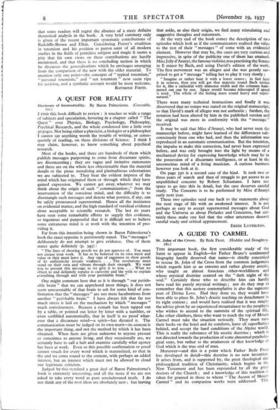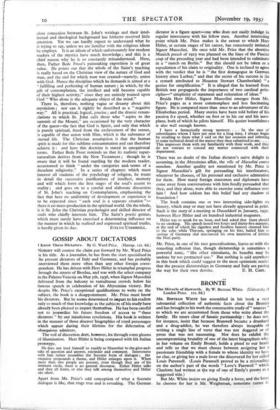A GUIDE TO CARMEL
St. John of the Cross. By Bede Frost. (Hodder and Stoughton.
THIS important book, the first considerable study of the Saint to appear in English—for Father Bruno's sentimental
biography hardly deserved that name—is chiefly concerned to rescue St. John of the Cross from the common judgement which regards him as an extreme and rather gloomy ascetic, who taught an almost ferocious , other-worldliness and whose mystical doctrine centred on the " dark night of the souL" Certainly those who so describe him can hardly have read his purely mystical writings ; nor do they stop to remember that this austere contemplative is also the supreme poet of Divine Love. Had they done so, they would have been able to place St. John's drastic teaching on detachment in its right context ; and would have realised that it was simply the advice given by an experienced mountaineer to the neophyte who wishes to ascend to the summits of the spiritual life: Like other climbers, those who want to reach the top of Mount Carmel must take the situation seriously. They must turn their backs on the hotel and its comforts, leave all superfluities behind, and accept the hard conditions of the Alpine world. This is really the substance of his ascetic doctrine ; which is not directed towards the production of some abnormal psycholo- gical state, but rather to the attainment of that knowledge of God which is the true end of man.
Moreover—and this is a point which Father Bede Frost has developed in detail—this doctrine is no new invention. It arises from, and is supported by, the great theological and philosophical tradition of Christianity, which begins in the New Testament and has been expounded by all the great doctors of the Church ; and a knowledge of this tradition is taken for granted in those to whom " The Ascent of Mount Carmel " and its companion works were addressed. This
close connexion. between: St. John's writings and their intel- lectual and theological background has hitherto received little attention. Yet we can hardly expect to understand what he is trying to say, unless we are familiar with the religious idiom he employs. It is an idiom of which unfortunately few modern readers of the mystics have much knowledge ; and this is a chief reason why he is so constantly misunderstood. Here, then, Father Bede Frost's painstaking exposition is of great value. He points out that the whole of the Saint's teaching is really based on the Christian view of the nature of God and man, and the end for which man was created—namely, union with God. Hence the discipline which he demands is aimed at a fulfilling and perfecting of human nature ; in which, by the gift of contemplation, the intellect and will become capable of their highest activity," since they are entirely trained upon God " Who alone is the adequate object of the mind."
There is, therefore, nothing vague or dreamy about this mysticism ; nor can it rightly be described as a " negative way." All is practical, logical, precise ; and the drastic renun- ciations to which St. John calls those who " aspire to the summit of the Mount," are occasioned by the very character of the quest—the fact that God is Spirit, and only that which is purely spiritual, freed from the enslavement of the senses, is capable of that union with Him, which is the substance of eternal life. The Christian assumption is that the human spirit is made for this sublime consummation and can therefore achieve it : and here this doctrine is stated in unequivocal terms. Father Bede Frost reminds us that its realistic super- naturalism derives from the New Testament ; though he is aware that it will be found startling by the modern reader, accustomed to think " under the categories and- terms of a decadent religiosity." In a series of chapters which must interest all students of the psychology of religion, he treats in detail the successive purifications of intellect, memory and will which form the first stages of the soul's ascent to reality ; and goes on to a careful and elaborate discussion of St. John's teaching on Contemplation, emphasising the fact that here no uniformity of development or experience is to be expected since " each soul is a separate creation "- there is no mass-production in the spiritual world. On the whole, it is St. John the Christian psychologist and skilled director of souls who chiefly interests him. The Saint's poetic genius, which must surely have exercised a determining influence on the manner in which he realised and expressed spiritual truths,

















































































































 Previous page
Previous page